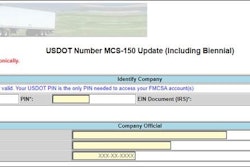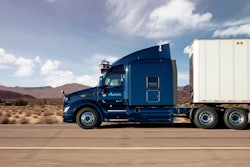Trucking news and briefs for Wednesday, Feb. 21, 2024:
Federal Maritime Commission upholds intermodal ‘chassis choice’ ruling
Tuesday, Feb. 13, the Federal Maritime Commission upheld a 2023 ruling that ocean carriers could not lawfully require motor carriers to use specific intermodal chassis providers to move containers.
The American Trucking Associations’ Intermodal Motor Carriers Conference (IMCC) in August 2020 filed a complaint against the Ocean Carrier Equipment Management Association (OCEMA), Consolidated Chassis Management and the world’s largest ocean carriers alleging they violated the Shipping Act by requiring carriers to use specific default chassis providers and denying motor carriers the right to select the chassis provider for dray moves (merchant haulage).
Last year, an FMC administrative law judge ruled in favor of the IMCC, noting that ocean shippers were violating the Shipping Act with the “practice of designating an exclusive chassis provider for merchant haulage and using merchant haulage volume to obtain discounted carrier haulage rates where motor carriers have no choice of chassis providers violates.” The judge ordered shippers to cease and desist the practices.
[Related: Intermodal haulers fight off a 'system collapse' at ports]

OCEMA and others named in the complaint appealed the ruling, arguing that the FMC “lacks jurisdiction because the challenged restrictions relate to their contracts with chassis providers and involve overland transportation between the ports and inland facilities.”
The full FMC said the administrative law judge’s ruling was supported “by the record and sound reasoning,” adding that the FMC “plainly has jurisdiction over allegations that ocean common carriers’ practices and rules governing chassis provisioning violate” the Shipping Act.
“The FMC has now confirmed that the actions of these ocean carriers are a clear violation of federal law and must stop,” said IMCC Executive Director Jonathan Eisen. “IMCC and ATA have been fighting this conduct by foreign-owned ocean carriers for more than a decade, so this ruling has been a long time coming.”
[Related: Port truckers score win in chassis choice lawsuit]
DOT issues safety advisory after chemical tank ‘rockets’ 300 feet
The Federal Motor Carrier Safety Administration and the Pipeline and Hazardous Materials Safety Administration (PHMSA) on Tuesday issued a safety advisory to provide notice of the possibility of “catastrophic failure” of certain hazardous materials tanks commonly known as “nurse tanks.”
The agencies said the notice focuses on nurse tanks manufactured from Jan. 1, 2007, through Dec. 31, 2011, by American Welding and Tank (AWT) at its Fremont, Ohio, plant. Nurse tanks manufactured by AWT from 2009 to 2010 were the subject of a prior FMCSA investigation and enforcement action in response to improper manufacturing procedures.
On Aug. 23, 2023, a 2009 AWT nurse tank containing anhydrous ammonia experienced a catastrophic failure in a farm co-op lot, resulting in the release of all product. The failure caused the tank shell to “rocket” over 300 feet from its original location, the agencies said.
“While no injuries were reported, this event is an indicator of potential continuing problems with AWT nurse tanks that have now been in service for over a decade,” the notice said.
Following the incident, the owner of the involved nurse tank contracted with a third-party testing company to have their eight AWT nurse tanks manufactured between 2008 and 2012 tested, which showed “extreme stress corrosion cracking, porosity, and inclusions/voids in the welds where the heads and shells of the nurse tanks were joined,” the notice said, adding that only a 2012 tank passed.
The owner submitted those results to engineering experts who were involved in previous research funded by FMCSA into similar issues with this series of AWT nurse tanks and voluntarily placed the nurse tanks out of service.
[Related: CVSA's new out of service criteria: What owner-operators need to know]
The parent company of the farm co-op subsequently conducted similar radiographic testing on 142 AWT nurse tanks manufactured between 2007 and 2012, and 100 failed the test -- all 2012 tanks passed.
While current hazmat regulations do not require periodic inspection and testing of nurse tanks that have attached and legible American Society of Mechanical Engineers (ASME) identification plates, FMCSA and PHMSA are “strongly recommending that owners of AWT nurse tanks manufactured between Jan. 1, 2007, and Dec. 31, 2011, that are exempted from periodic inspection and testing requirements” conduct voluntary periodic visual inspections, thickness testing and pressure testing.
For owners of affected AWT nurse tanks unable to conduct voluntary pressure testing, the agencies recommend that either radiographic or ultrasonic testing be conducted. While the period of voluntary inspection and testing is at the discretion of the nurse tank owner, inspection and testing is recommended at least once every five years.
Car haulers get warning flag exemption renewal
The Federal Motor Carrier Safety Administration is provisionally renewing an exemption requested jointly by the Automobile Carriers Conference (ACC) of the American Trucking Associations and the Auto Haulers Association of America (AHAA) to relieve truckers operating stinger-steered car-haul equipment from the requirement to place warning flags on projecting loads of new and used motor vehicles.
The Federal Motor Carrier Safety Regulations (FMCSRs) require any truck transporting a load that extends more than four feet beyond the rear of the vehicle be marked with a single red or orange fluorescent warning flag at the extreme rear if the projecting load is two feet wide or less, two warning flags if the projecting load is wider than two feet.
In its original exemption request, ACC noted that stinger-steered automobile transporters have been allowed to have a rear vehicular overhang of at least six feet since December 2015..
ACC contended that adhering to flag requirements while transporting new motor vehicles posed a challenge to the vehicle industry because manufacturers don’t want anything to scratch or damage the vehicles. The group added that reflectors equipped on cars being transported adequately meet the intention of the regulation requiring flags.
The waiver is provisionally renewed for six months through Aug. 9, 2024.
[Related: Car-haul trailer configurations, costs: High-mount v. stinger-steer, insurance, more]










